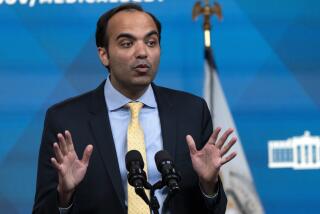Banks could see new twists applied to mortgage settlement

- Share via
Major banks will soon be seeing better enforcement of last year’s big settlement of foreclosure-abuse complaints, according to a monitor for the agreement and a group of state and federal officials who negotiated it.
The officials said the banks appear to have exceeded the $25 billion in relief they promised 16 months ago for troubled borrowers. And a monitor’s report Wednesday showed that certain egregious practices -- such as “robo-signing” court documents and charging borrowers fees to consider modifying loans -- had been eliminated.
But despite the successes, the report issued by monitor Joseph A. Smith Jr. revealed serious trouble spots in the banks’ compliance with reforms in mortgage customer-service practices.
The biggest problems arose during the frustrating, often lengthy limbo between the time borrowers apply for a loan modification to ease the terms of their mortgages and the point at which the modification is approved or denied.
Quiz: test your knowledge of mortgages
Encouraging efficient modifications was a goal of the 49 state attorneys general and the federal departments of Justice, Treasury and Housing and Urban Development, whose lengthy negotiations produced the settlement in February 2012.
The settlement requires the banks to provide a “single point of contact” for anyone seeking a modification. The provision addresses complaints that troubled borrowers were bounced from employee to employee, often getting conflicting signals.
But the provision seems to have failed. According to Smith’s report, a third of the 60,000 serious complaints about the banks’ handling of distressed loans from last October through March had to do with single points of contact. The contacts were either not provided or were unhelpful or hard to reach.
The report’s conclusions didn’t fault the banks on this issue, though, because the tests gauging compliance focused only on whether a single-point-of-contact system had been established -- not whether the system actually helped borrowers.
Shaun Donovan, the Obama administration’s secretary for Housing and Urban Development, said he expected Smith would add new metrics, as the tests of bank performance are called, to respond to the complaints.
“We do believe the banks have to go beyond just providing a single point of contact to making sure that the single point of contact is knowledgeable, responsive and effective,” Donovan said during a conference call with reporters.
In an interview, Smith said the complaints about ineffective single-point-of-contact systems had been raised loudly by advocacy groups and the attorneys general, and so were not unexpected. He said he planned to create new tests measuring whether single point of contact was effective.
Other problems were surprising, Smith said, including the inability of many borrowers to get reliable information on exactly what they owed in unpaid principal and interest and fees and penalties.
“This is one we didn’t really expect,” he said. “So we’ll try to add a metric.”
Bank of America Corp., Wells Fargo & Co., JPMorgan Chase & Co. and Citigroup Inc., all part of the settlement and all having failed at least one of Smith’s tests, declined to comment on how the performance tests might be changed.
A Wells Fargo spokesman acknowledged that the settlement permits the monitor to impose additional metrics, “so it’s certainly his prerogative to do so if the circumstances warrant.”
Another proposed change, involving so-called dual tracking, probably would require the consent of the banks, said Iowa Atty. Gen. Tom Miller, a leader of the negotiations that produced last year’s settlement.
Dual tracking refers to a bank pursuing foreclosure at the same time a borrower is seeking or has been granted a loan modification. The settlement required banks to cease foreclosure proceedings as soon as a troubled borrower’s application for a modification was complete.
However, determining completion was left to the banks, as Smith pointed out. Critics said foreclosures often went ahead even though the gaps in the application were inconsequential, such as a borrower leaving an answer box empty instead of writing in “N/A,” for “not applicable.”
Miller proposed that dual tracking be halted as soon as certain basic information for the application is complete.
“The banks have not agreed to it, but we’ve had good discussions with two banks,” he said.
“Because homeowners would be protected in that way, the banks would have an incentive to move things along more quickly,” Miller said. “It’s the kind of thing that we’re talking about and thinking about and working with the banks to make this thing better.”
ALSO:
Study: Gay couples face housing discrimination
Bank compliance with settlement lacking, monitor reports
Home price increases expected to tail off as supply increases
More to Read
Inside the business of entertainment
The Wide Shot brings you news, analysis and insights on everything from streaming wars to production — and what it all means for the future.
You may occasionally receive promotional content from the Los Angeles Times.











